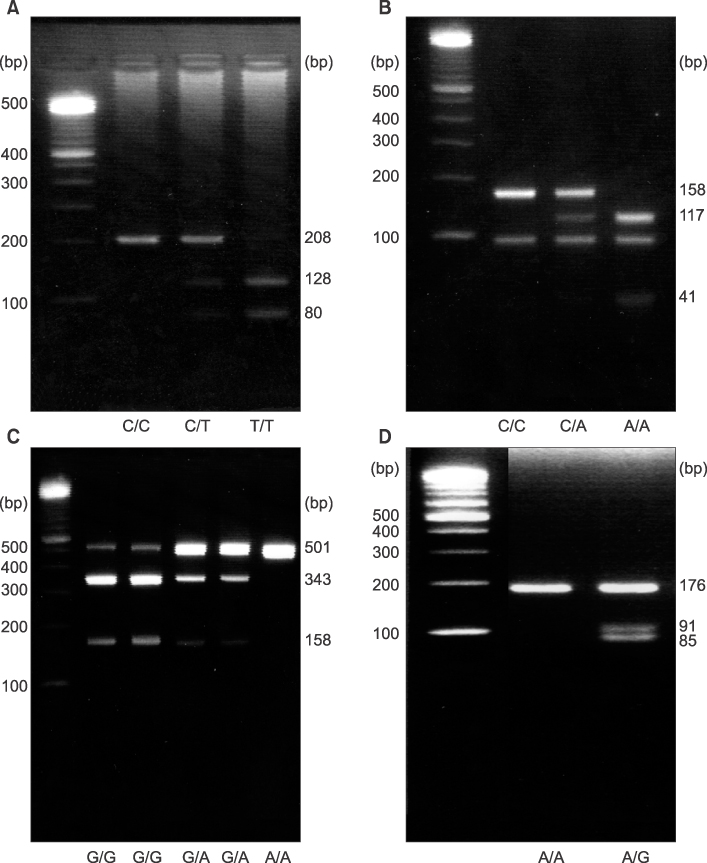J Korean Surg Soc.
2010 Jun;78(6):350-356. 10.4174/jkss.2010.78.6.350.
Chemotherapeutic Responsibility according to Polymorphism of ERCC1, XRCC1 and GSTP1 in Gastric Cancer Patients Receiving Oxaliplatin Based Chemotherapy
- Affiliations
-
- 1Department of Surgery, Seoul St. Mary's Hospital, College of Medicine, The Catholic University of Korea, Seoul, Korea. hmjeon@catholic.ac.kr
- KMID: 2211965
- DOI: http://doi.org/10.4174/jkss.2010.78.6.350
Abstract
- PURPOSE
The platinum-based modified FOLFOX-6 has been reported as an acceptable chemotherapeutic regimen in treatment of advanced gastric cancer patients. The response rate and drug-induced toxicity of platinum-based chemoagents is different according to several gene polymorphism such as ERCC1, XRCC1 and GSTP1 genes, which were related with therapeutic mechanisms. We aimed to evaluate the effect of gene polymorphism and determine the possibility as prediction factor for responsibility in advanced and recurrent gastric cancer patients treated with modified FOLFOX-6 regimen.
METHODS
This study was conducted with 55 patients. We sampled 20 ml of peripheral blood to isolate DNA from lymphocytes, and identified genotypes of 3 genes (ERCC1, XRCC1, GSTP1) by PCR-RFL of extracted DNA. Based on medical records, retrospective analysis was made on the patients' clinical characteristics.
RESULTS
The overall response rate to modified FOLFOX-6 was 40.0% (22/55). In polymorphism of ERCC1 C8092A, the wild type (CC) showed a statistically significantly lower response rates to chemoagents than the mutant type (CA/AA). In the subtypes of ERCC1 C118T, however, the wild type (CC) showed statistically significantly lower hematological toxicity than the mutant type (CA/AA). But, there was no statistically significance in survival analysis.
CONCLUSION
We suggest that ERCC1 gene polymorphism is clinically more adequate as a feasible factor for predicting the response rate and toxicity of modified FOLFOX-6 regimen in gastric cancer patients.
Keyword
MeSH Terms
Figure
Reference
-
1. Ministry of Health and Welfare. 2002 Annual Report of the Korea Central Cancer Registry: Based on Registered Data from 139 Hospitals. 2003. Seoul: Ministry of Health and Welfare.2. Louvet C, Andre T, Tigaud JM, Gamelin E, Douillard JY, Brunet R, et al. Phase II study of oxaliplatin, fluorouracil, and folinic acid in locally advanced or metastatic gastric cancer patients. J Clin Oncol. 2002. 20:4543–4548.3. Al-Batran SE, Atmaca A, Hegewisch-Becker S, Jaeger D, Hahnfeld S, Rummel MJ, et al. Phase II trial of biweekly infusional fluorouracil, folinic acid, and oxaliplatin in patients with advanced gastric cancer. J Clin Oncol. 2004. 22:658–663.4. Chao Y, Yeh KH, Chang CJ, Chen LT, Chao TY, Wu MF, et al. Phase II study of weekly oxaliplatin and 24-h infusion of high-dose 5-fluorouracil and folinic acid in the treatment of advanced gastric cancer. Br J Cancer. 2004. 91:453–458.5. Evans WE, Relling MV. Pharmacogenomics: translating functional genomics into rational therapeutics. Science. 1999. 286:487–491.6. Martin LP, Hamilton TC, Schilder RJ. Platinum resistance: the role of DNA repair pathways. Clin Cancer Res. 2008. 14:1291–1295.7. Weaver DA, Crawford EL, Warner KA, Elkhairi F, Khuder SA, Willey JC. ABCC5, ERCC2, XPA and XRCC1 transcript abundance levels correlate with cisplatin chemoresistance in non-small cell lung cancer cell lines. Mol Cancer. 2005. 4:18.8. Hayes JD, Pulford DJ. The glutathione S-transferase supergene family: regulation of GST and the contribution of the isoenzymes to cancer chemoprotection and drug resistance. Crit Rev Biochem Mol Biol. 1995. 30:445–600.9. Park DJ, Zhang W, Stoehlmacher J, Tsao-Wei D, Groshen S, Gil J, et al. ERCC1 gene polymorphism as a predictor for clinical outcome in advanced colorectal cancer patients treated with platinum-based chemotherapy. Clin Adv Hematol Oncol. 2003. 1:162–166.10. Mort R, Mo L, McEwan C, Melton DW. Lack of involvement of nucleotide excision repair gene polymorphisms in colorectal cancer. Br J Cancer. 2003. 89:333–337.11. Sreeja L, Syamala V, Hariharan S, Syamala VS, Raveendran PB, Sivanandan CD, et al. Glutathione S-transferase M1, T1 and P1 polymorphisms: susceptibility and outcome in lung cancer patients. J Exp Ther Oncol. 2008. 7:73–85.12. Rabik CA, Dolan ME. Molecular mechanisms of resistance and toxicity associated with platinating agents. Cancer Treat Rev. 2007. 33:9–23.13. Gately DP, Howell SB. Cellular accumulation of the anticancer agent cisplatin: a review. Br J Cancer. 1993. 67:1171–1176.14. Marsh S, McLeod HL. Cancer pharmacogenetics. Br J Cancer. 2004. 90:8–11.15. Fink D, Nebel S, Aebi S, Zheng H, Cenni B, Nehme A, et al. The role of DNA mismatch repair in platinum drug resistance. Cancer Res. 1996. 56:4881–4886.16. Dabholkar M, Vionnet J, Bostick-Bruton F, Yu JJ, Reed E. Messenger RNA levels of XPAC and ERCC1 in ovarian cancer tissue correlate with response to platinum-based chemotherapy. J Clin Invest. 1994. 94:703–708.17. Metzger R, Leichman CG, Danenberg KD, Danenberg PV, Lenz HJ, Hayashi K, et al. ERCC1 mRNA levels complement thymidylate synthase mRNA levels in predicting response and survival for gastric cancer patients receiving combination cisplatin and fluorouracil chemotherapy. J Clin Oncol. 1998. 16:309–316.18. Shirota Y, Stoehlmacher J, Brabender J, Xiong YP, Uetake H, Danenberg KD, et al. ERCC1 and thymidylate synthase mRNA levels predict survival for colorectal cancer patients receiving combination oxaliplatin and fluorouracil chemotherapy. J Clin Oncol. 2001. 19:4298–4304.19. Watson MA, Stewart RK, Smith GB, Massey TE, Bell DA. Human glutathione S-transferase P1 polymorphisms: relationship to lung tissue enzyme activity and population frequency distribution. Carcinogenesis. 1998. 19:275–280.
- Full Text Links
- Actions
-
Cited
- CITED
-
- Close
- Share
- Similar articles
-
- Genetic Polymorphism of GSTP1: Prediction of Clinical Outcome to Oxaliplatin/5-FU-based Chemotherapy in Advanced Gastric Cancer
- ERCC1 and the Prognosis for Patients With Colon Cancer Receiving Oxaliplatin-Based Adjuvant Chemotherapy
- Single nucleotide polymorphism of GSTP1 and pathological complete response in locally advanced rectal cancer patients treated with neoadjuvant concomitant radiochemotherapy
- Combination of TRAP1 and ERCC1 Expression Predicts Clinical Outcomes in Metastatic Colorectal Cancer Treated with Oxaliplatin/5-Fluorouracil
- Oxaliplatin-induced Sudden Hearing Loss in a Patient with Pancreatic Cancer



